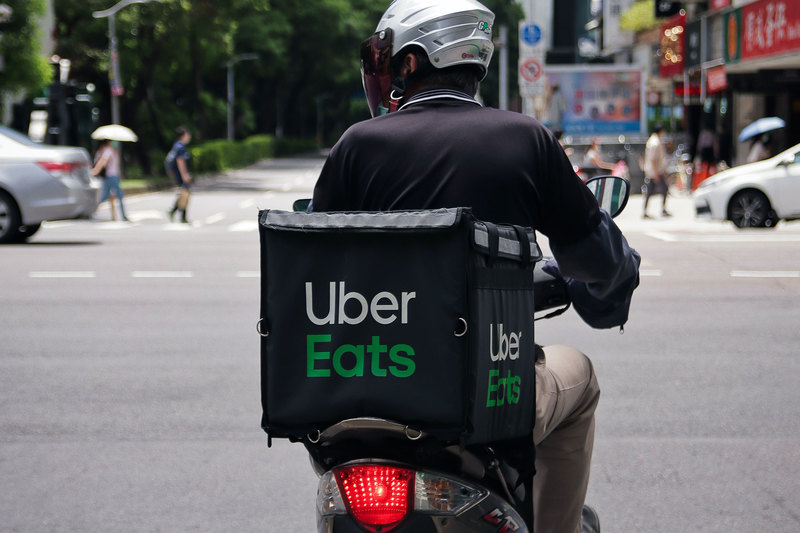New ratings of service apps’ labour practices aim to inform consumer choices
16 September 2022 | Story Wendyl Martin. Photo Unsplash. Read time 8 min.
You need a lift to town: you request an Uber or cross-check Bolt’s fares; it’s lunchtime and you’re craving your favourite burger: you order on Mr D; you need to quickly have your house cleaned before visitors arrive at home tomorrow: you request a “SweepStar” … From transport to buying meals and domestic chores, convenience services are all a click or swipe away on a smartphone app or platform. Beyond a voluntary tip, just how much thought are we giving to the drivers, couriers or cleaners and handymen that appear on time for their work? Are they making a livelihood, is the work worth it, and how are platform owners treating and compensating them?
On 8 September 2022, staff of the University of Cape Town’s (UCT) Department of Information Systems released the results of the annual Fairwork South Africa Ratings, a system that scores the labour practices and worker treatment of platform businesses against five principles: fair pay, conditions, contracts, management and representation. Pitso Tsibolane, a senior lecturer in the department and a principal investigator of the 2022 Fairwork project in South Africa, said 13 platforms across the ride-hailing, food-delivery, courier and domestic-services sectors were evaluated against the five principles, and were given a score out of 10 based on the quality of work they provide.
This is the fourth set of Fairwork scores done for South Africa, a project that Tsibolane described as a “multinational research project that shines the spotlight on working conditions in the platform economy”. The project is based at the University of Oxford in the United Kingdom and the WZB (Wissenschaftszentrum Berlin) Social Science Center in Germany. Through a global network of researchers based in more than 30 countries across five continents, the team at UCT collaborate closely with workers, platforms and policy makers to research the building of a fairer future of work.
“Our goal is to show that better and fairer jobs are possible in the platform economy.”
“Our goal is to show that better and fairer jobs are possible in the platform economy ... We evaluate and rank the working conditions of digital platforms based on a set of principles that digital labour platforms should maintain in order [to] be considered to be offering basic minimum standards of fairness,” said Tsibolane.
The scores were calculated through desk research, worker interviews and manager interviews.
Dr Murali Shanmugavelan of the Oxford Internet Institute, who is involved with Fairwork’s central team, explained: “The desk research involved a literature review to ascertain which platforms are operating in each city; this helps us map the largest and most influential platforms. Typically, we interview six to 10 workers per platform. This is a very qualitative interview, and we try to get insights from each worker on their experiences and how platform policies affect their conditions. We later take findings from the first two steps of data collection to platform managers. We request evidence of each of the Fairwork principles.”
Homegrown app leads the way amid rising costs
The results show that homegrown app SweepSouth, a home cleaning and gardening services platform, came out tops with a score of seven out of 10, while a second place tie went to getTOD (platform for tradespeople such as plumbers, handymen, locksmiths and electricians), M4Jam (micro-jobbing platform) and Mr D (food courier service) with a score of six out of 10.
Report author Dr Sharon Geeling, a postdoctoral research fellow in the Department of Information Systems, said they were unable to find sufficient evidence to award any points to three platforms this year, so the score for these is zero. These were on-demand logistics service Droppa, ride-hailing app InDriver and shopping task app Secret Agent.
Key themes that emerged from the research were rising costs, safety, and the difficulty of making ends meet. Transport and high fuel prices were among the main drivers of rising costs for platform workers.
“Most of the workers we interviewed across the different sectors reported the price of fuel or transportation as the biggest contributor to their costs.”
“As independent contractors, platform workers must cover all their work-related costs themselves. In South Africa, the transport sector has seen the highest price acceleration, and most of the workers we interviewed across the different sectors reported the price of fuel or transportation as the biggest contributor to their costs. Although more than half of the platforms failed to meet the national minimum wage (R23.19 an hour) after costs, most of the workers we interviewed haven’t seen an increase to base rates during their time on the platform,” said Dr Geeling.
Almost half the workers they interviewed raised safety as their main challenge during platform work.
“Platform workers have been finding it increasingly difficult to make ends meet, so this puts additional pressure on them to accept high-risk work like venturing into crime-ridden areas or women working after dark.
“In this context of rising costs, platform workers have found ways to make ends meet. Some workers have resorted to working outside the app; so here we see a platform’s client details obtained in some way like through a screenshot, and then the worker contacts the client directly with better pricing options,” added Geeling.
Fairwork scores inform better consumer choices
One of the aims of the ratings, said Professor Jean-Paul van Belle, a co-principal investigator for Fairwork in South Africa and a professor in the Department of Information Systems, was to sensitise consumers to which platforms reward workers and give fair contributions.
“In paying fair wages, the customer or consumer should also take responsibility for making sure that they pay a fair rate to the platform that then translates to a fair contribution to the worker. The consumer then has the responsibility to look at which platforms reward and give a fair share of that payment to the workers,” said Professor Van Belle.
For Professor Ines Meyer, the South African Research Chairs Initiative Chair in Creation of Decent Work and Sustainable Livelihood at UCT, legislation and force will not remedy the working conditions.
“As consumers we have to change our behaviour and start using our buying power to reflect the change we want to see.”
“It is less likely to lead to success if people are forced into doing things. There is a role for legislation, but if an organisation is forced into doing something, it is because they are forced and not because they believe in it. What we need is buy-in ... It is not about putting people in the corner, it is about collaboration that can make this work,” said Meyer.
To this effect, Fairwork has developed a pledge for organisations to commit themselves to pay attention to the working conditions of platform workers.
Tsibolane said: “We’re asking [platforms] to pay attention to their relative scores and the scores of different platforms ... We have worked with them and they have changed some of their practices.
“Change does not happen by itself; we have to put pressure on policy makers and the platforms. As consumers we have to change our behaviour and start using our buying power to reflect the change we want to see.”
 This work is licensed under a Creative Commons Attribution-NoDerivatives 4.0 International License.
This work is licensed under a Creative Commons Attribution-NoDerivatives 4.0 International License.
Please view the republishing articles page for more information.










